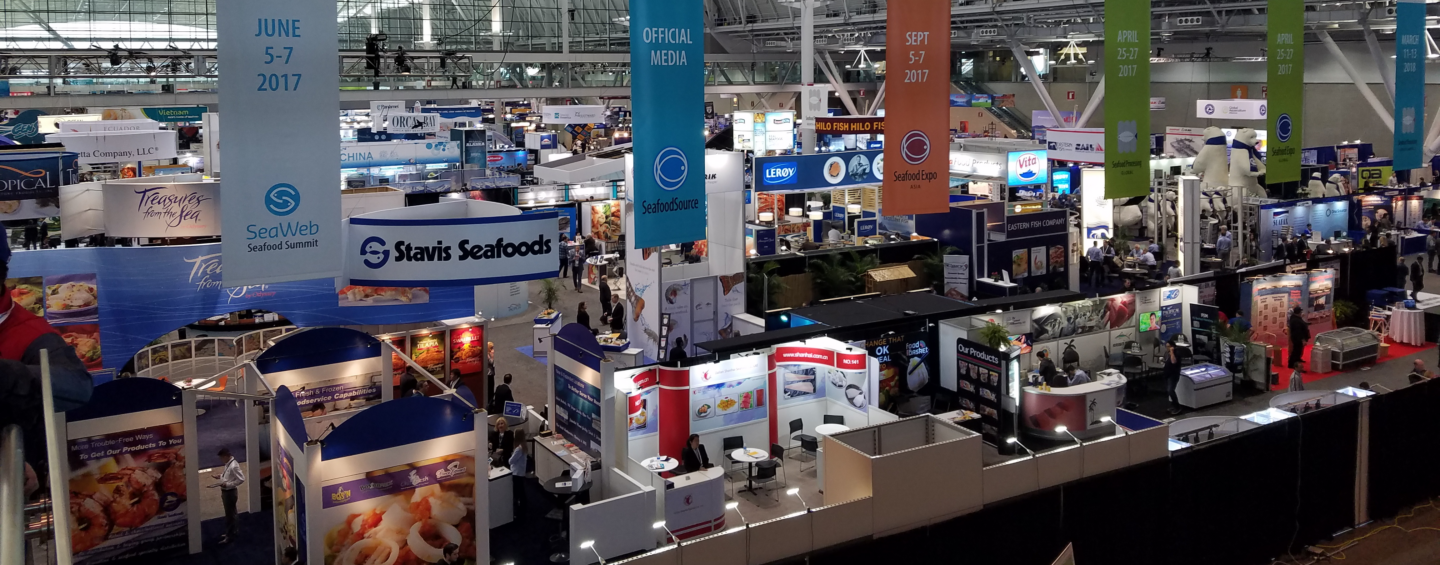Editor’s note: This is part two of Sean’s recap of SFP’s activities in Boston during Seafood Expo North America. You can read part one here.
SFP staff held meetings throughout the weekend leading into the show, focusing on various supply chain roundtables (SRs). Here is a sampling of what took place:
- At the Fresh/Frozen Tuna SR meeting, hosted by SFP’s Tom Pickerell, participants met for a lengthy session covering a variety of projects, with several external speakers. NorPac’s Tom Kraft noted that the Western and Central Pacific Fisheries Commission (WCPFC) must make progress on comprehensive harvest strategies so that the Marine Stewardship Council sustainability certification conditions in fisheries NorPac sources from are met. Kraft mentioned that that will only happen with the help of multiple players in the supply chain pressing for the changes. “Tom’s call to action echoes what we and other NGOs have been saying, and to hear it coming from an industry leader was fantastic. Now we must act,” Pickerell said.
- Pickerell also held a second, “mini” SR meeting regarding Indonesian tuna on the show floor itself, at the Indonesian seafood pavilion. One big takeaway he had from that was the need going forward to convey the value of sourcing from fisheries involved in FIPs. “The producers repeatedly noted that their main buyers, Japanese companies, weren’t seeking FIPs, so there was little drive to get involved.”
- Members of the Global Octopus SR met and, among other improvement efforts in Morocco, Mauritania and Philippines, discussed creating a new FIP for Yucatan octopus. The fishery covers between 13,000 and 19,000 tonnes per year, representing around 4.5 percent of global production. At the end of the meeting, industry stakeholders signed a memorandum of understanding that signaled the beginning of the new FIP. SFP’s Pedro Ferreiro, who led the meeting, said he was pleased with the turnout and engagement by the stakeholders. “This year’s meeting in Boston has been an open window to show other industry folks and NGO community stakeholders that transformation of this seafood sector at a global scale is going to be driven by the Global Octopus SR and its members, and also that the doors are open for anyone to join the group in this endeavor.”
- SFP also announced a new aquaculture improvement project (AIP) which will take place over the next two years in Banyuwangi, East Java, Indonesia. SFP is coordinating the project, together with Conservation International, IDH—the Sustainable Trade Initiative, and Longline Environment. The Indonesian Ministry of Marine Affairs and Fisheries, the Indonesian Ministry of National Development Planning, and the Financial Service Authority of Indonesia will all be collaborating on the project as well. The project will focus on management of shrimp farms in the region, and feature a zonal management approach to disease mitigation.
CASS Highlights T75
The collaborative spirit of Target 75 was highlighted at the annual reception for the Conservation Alliance for Seafood Solutions, held Saturday night. Dick Jones, President and CEO of Ocean Outcomes, highlighted a variety of examples of other Alliance NGOs working with SFP to advance T75 in an address to the crowd. He also mentioned the value of supply chain roundtables as a tool for implementing improvement measures, and noted parallels between T75 and the UN’s Sustainable Development Goal 14.
Jones noted that SFP’s efforts to work together with industrial stakeholders should serve as inspiration for NGO cooperation.
“Collaborations are not just for businesses, but for NGOs as well,” he said.
On the panel
SFP participated this year in the expo’s conference program as well, presenting a panel on Monday discussing the value in scaling FIPs up to and including the national level.
More than 40 people nearly filled the room as SFP CEO Jim Cannon served as moderator, with panelists Jack Scott, VP of Sustainability and Responsible Sourcing at Nestlé; Hamish Walker, Chief Operating Officer at Seattle Fish Co.; and Mario Alfonso Miranda, President of the Committee for the Sustainable Management of the Southern Pacific Jumbo Flying Squid (CALAMASUR).
Each panelist discussed experiences working with various species in other countries, and how they all interacted with governments or regulatory groups as part of their work. Miranda’s work focused on squid fishing in waters off Peru, but he said he also had experience working with a regional fishery management organization (RFMO).
What worked for him was making sure he and his fellow industrial stakeholders knew what they wanted to ask for long before approaching the RFMO. Being of one voice, he said, was instrumental to securing the RFMO’s attention to and cooperation with improvement efforts.
“Very few times has industry come together (so) aligned,” he said.
Walker said that with a tuna FIP in Sri Lanka, he and his fellow stakeholders learned the hard way that collaborating with local governments and regulators may be more important that one thinks. The FIP initially hit a few stumbling blocks before finding success, and Walker acknowledged that if he had to do it over again, he would work more closely with the Sri Lankan government from the beginning.
“(Simply) showing up and saying ‘We’re going to run a FIP in your country’ was probably the wrong approach,” he said.
Scott, who has worked with the National Fisheries Institute’s Crab Council, noted that small projects are a good start, but to effect real change there needs to be room to grow.
“There’s always a point at which those kinds of projects stall out,” he said of smaller efforts.

